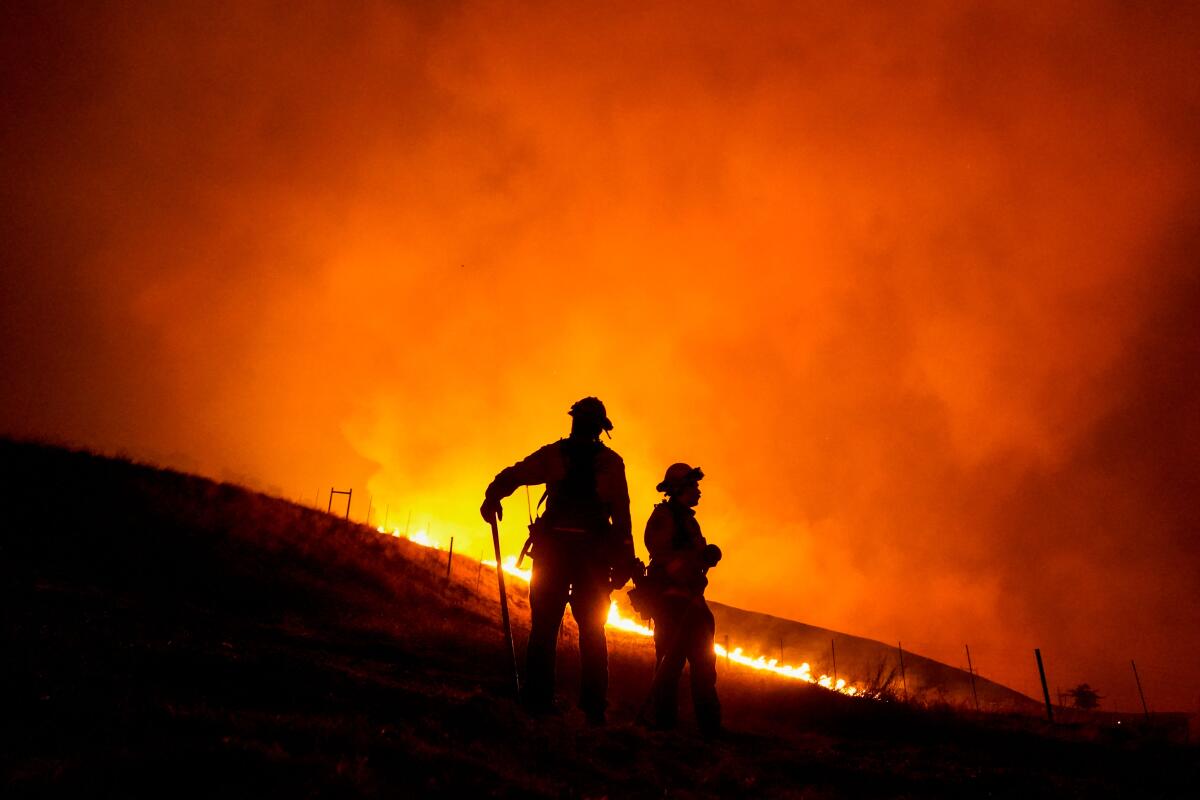Memorial Day weekend means the start of summer vacations — and also the onset of wildfire season. Many Californians will be going “naked.”
Lots more will be only partially covered, unable to afford so-called wrap-around protection.
We’re talking about home insurance. Hundreds of thousands of Californians have been abandoned by their property insurers because they live in risky fire-prone areas.
“It’s one of the biggest challenges facing this state right now,” says new state Senate leader Mike McGuire (D-Healdsburg), whose mostly rural district includes North Coast forests and world-class wineries.
In his region, McGuire says, “the topic of insurance is top-of-mind. You can’t go into a coffee shop or grocery store without hearing about it. Thousands and thousands have been non-renewed by insurance companies.”
When a Californian loses fire insurance, there are two basic options: Go without protection and risk losing what for many people is their most valuable asset — known as going naked. Or sign up with a last-resort insurer called the FAIR Plan.
Going naked is practically impossible for mortgage holders because lenders insist on their homes being insured. But it’s tempting for some people who’ve paid off their home, are retired and living on fixed incomes without much spare change.
The FAIR Plan was created by the state in the 1960s after the Watts riots and some natural disasters prompted insurers to bail. It’s funded by the insurers and has about 375,000 policyholders.
But a FAIR policy is very costly and often covers only fire, not household goods or liability.
“I don’t know how fair it is. It’s so expensive it’s ridiculous,” says Jodi Goodenough, who lost fire insurance for her modern Placer County home in a Sierra forest.
Ironically, her husband, John, owns an insurance agency — and they couldn’t get traditional coverage despite their home being fire-hardened with a metal roof and stucco siding. “They [insurers] don’t care,” Jodi says.
Full confession: She’s my niece.
In adjacent El Dorado County in the Sierra foothills, then-Placerville Mayor Michael Saragosa lost his home insurance two years ago despite living near two fire hydrants and a fire station.
He got stuck with a FAIR policy that raised his insurance cost by 40%. “I feel lucky,” he says. “I know people paying 100% more. Four out of five City Council members are now on the FAIR Plan.”
Political connections and insider insurance knowledge don’t matter.

Workers with the Santa Rosa Fire Department battle the Shady fire as it winds toward homes in Santa Rosa in 2020.
(Kent Nishimura / Los Angeles Times)
Former state Insurance Commissioner Steve Poizner, who lives in a wooded area of the Silicon Valley in Santa Clara County, was dropped by his insurer two years ago.
“I’m a former insurance commissioner of California. If it happened to me, it can happen to you,” Poizner wrote in an op-ed for the Los Angeles Times.
Poizner hooked up with an out-of-state carrier. “It was half the coverage and twice the price,” he told me recently. Eventually he found a willing California insurer.
“But now they’ve just notified me they’re not going to renew,” Poizner added. “This is a broken system.”
It isn’t broken just in California. It’s a nationwide crisis. Climate change is the consensus culprit because it’s blamed for escalating wildfires, flooding, hurricanes, tornadoes….
The New York Times reported this month that insurers lost money on homeowners coverage in 18 states last year.
“The result,” it wrote, “is that insurance companies are raising premiums by as much as 50% or more, cutting back on coverage or leaving entire states altogether.”
Denni Ritter, a Western states lobbyist for the American Properties Casualty Insurance Assn., says: “What’s unique to California is our regulatory system under Proposition 103. Insurers haven’t had the ability to adjust rates to absorb prices….
“In California, for every $1 in premiums, insurers paid out $1.13 in claims between 2012 and 2022. The California situation is untenable.”
Proposition 103 was a citizens’ initiative approved by voters in 1988. It rolled back rates by 20% for home, fire, auto and many types of insurance. And it created an elected insurance commissioner who must approve rate hikes before they can take effect.
But the insurance industry and current Commissioner Ricardo Lara insist it takes too long — up to a year or more — for approvals. Proposition 103 promised 60 days. Lara is aiming for that.
“We’re clearly operating under 20th century regulations when it’s the 21st century,” Lara says.
There’s a lot of finger pointing.
“The problem is insurance companies are greedy and don’t want to insure people without getting as much money from them as they can,” says Jamie Court, president of Consumer Watchdog, which wrote Proposition 103.
“Our plan is to require insurance companies to insure everyone who hardens their home. And it should be reasonably priced.”
Something like that makes sense.
McGuire, who’s considering a race for insurance commissioner, promises legislation this year to provide incentives for owners to harden their homes — make them more fire-safe. There should be insurer discounts and perhaps government tax credits, he says.
Insurers want to be allowed to project their future liabilities when setting premium rates. Other states permit that. Sounds logical.
And they’re asking to be reimbursed through premium rates for their cost of insuring themselves against claims resulting from natural disasters.
Lara promises new regulations by year’s end. That seems too long. He blames the slowness on Proposition 103’s rules.
And Gov. Gavin Newsom is pushing for legislation — at least verbally. There’s little action so far.
“We’ve got one more fire season to go through. This will be the last summer of risk before having a stable insurance market,” predicts Sen. Bill Dodd (D-Napa), whose wine country district was devastated by fire and has been active in fire prevention legislation.
“Now we have many cases of people going naked without any insurance. Way more than anybody knows.”
There’s no good excuse for them not being offered affordable coverage.

